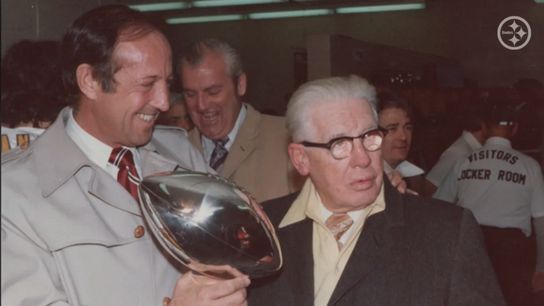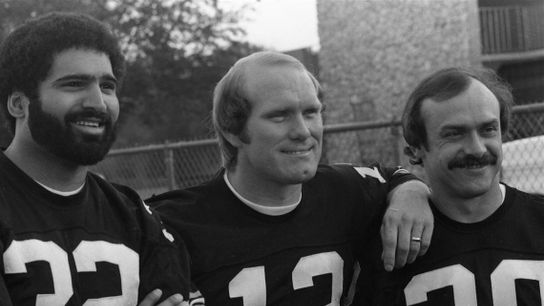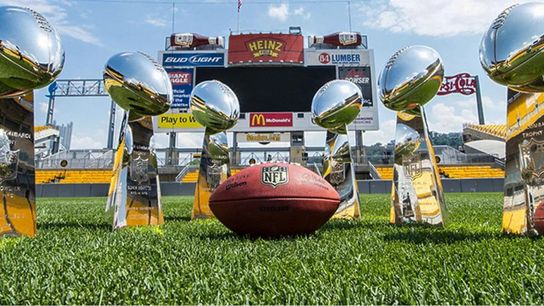The Pittsburgh Steelers, originally known as the Pittsburgh Pirates, joined the NFL on July 8, 1933. Founded by Art Rooney, the team took its name from the baseball team, a common practice at the time. In the early years, the Steelers struggled significantly, often finishing seasons with losing records and failing to make a mark in the league. The team did not achieve a winning season until 1942 and was considered an underdog for much of its early history.

steelers.com
Late Steelers Owner, Art Rooney gets first of four Lombardi Trophies in the 1970s.
During World War II, the team faced player shortages and temporarily merged with other teams. In 1943, they combined with the Philadelphia Eagles to form the Steagles and, in 1944, with the Chicago Cardinals to create Card-Pitt.
The Rise of a Dynasty: The 1970s
The 1970s marked a turning point for the Steelers, transforming them from perennial underachievers to one of the most successful franchises in NFL history. Under Head Coach Chuck Noll, who took over in 1969, the Steelers drafted key players who would become hallmarks of their success. Names like Terry Bradshaw, Franco Harris, "Mean" Joe Greene, and Jack Lambert are etched in NFL lore.
The team won four Super Bowl titles in six years, securing victories in Super Bowls IX, X, XIII, and XIV. This unprecedented success cemented their reputation as a dynasty. The "Steel Curtain" defense, known for its toughness and dominance, became legendary during this era. The Steelers' remarkable run included eight consecutive playoff appearances from 1972 to 1979, underscoring their dominance.
Super Bowl Success and Continued Excellence
After the glory years of the 1970s, the Steelers continued to be a competitive force in the NFL. They added two more Super Bowl titles in the 2000s, winning Super Bowl XL in 2005 and Super Bowl XLIII in 2008. These victories brought them to six Super Bowl championships, currently tying them with the New England Patriots for the most in NFL history.
Key players during these years included quarterback Ben Roethlisberger, wide receiver Hines Ward, and safety Troy Polamalu. The team was known for its resilience and ability to perform under pressure, often winning critical games dramatically. Their success in the 2000s shows the strong organizational foundation laid down by the Rooney family, which has owned the team since its inception.

Gene J. Puskar / AP
Former Pittsburgh Steelers quarterback, Ben Roethlisberger (7) and former wide receiver, Hines Ward (86).
Moreover, betting on the Steelers' games has always been popular among fans, especially during their playoff runs. Betting fans looking for bonuses can check out the latest promo code for VA lottery.
Home Fields and Fan Base
The Steelers' home fields have changed over the decades. They started at Forbes Field, moved to Pitt Stadium, and then to Three Rivers Stadium, where they played from 1970 to 2000. In 2001, they began playing at Heinz Field, now known as Acrisure Stadium. Each venue has witnessed memorable moments, from the "Immaculate Reception" at Three Rivers to countless playoff games at Heinz Field.
The Steelers boast a passionate and widespread fan base known as "Steeler Nation." This dedicated following supports the team through thick and thin, making every game day vibrant. The team's fan base is not confined to Pittsburgh; it spans the globe, with fans proudly donning the black and gold colors.
Hall of Famers and Notable Figures
The Pittsburgh Steelers have produced numerous Hall of Famers and legendary football figures. The franchise has 32 members in the Pro Football Hall of Fame, including iconic names like Franco Harris, Terry Bradshaw, and "Mean" Joe Greene. Their contributions have defined the franchise and left an indelible mark on the NFL.

Morris Berman / Pittsburgh Post-Gazette
Steelers' Franco Harris (32), Terry Bradshaw (#12), and Rocky Bleier (#20) in the 1970s.
Final Words
The Pittsburgh Steelers' history is a story of perseverance, strategic excellence, and community support. From their humble beginnings in the 1930s to their dominance in the 1970s and continued success into the 21st century, the Steelers have established themselves as one of the most storied franchises in NFL history.



